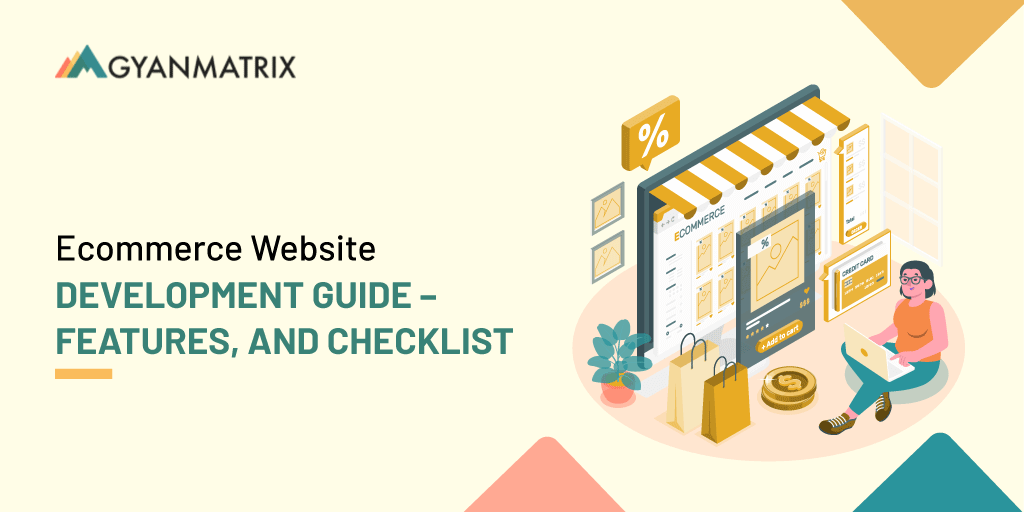Ecommerce Website Development Guide – Features, and Checklist
Companies trying to grow and improve consumer experiences must have a strong eCommerce website. An eCommerce website acts as a company’s virtual shop, allowing them to display their goods and services, process payments, and communicate with clients. Their clients can easily learn about their services, features, and what makes them stand out from the rest.
More than ever, creating an eCommerce e commerce web development that is feature-rich and well-optimized is essential, as the worldwide eCommerce market is predicted to reach over $6.3 trillion by 2024. An overview of the necessary and optional components for a successful eCommerce website is given in this article, along with a checklist to make sure nothing is missed.
Planning Your eCommerce Website
Thorough planning is essential before beginning the development process.
-
Know Your Market and Choose The Right Platform
The first step in creating an eCommerce website is to understand your target market, and industry trends. You should do extensive market research to learn about the trends and competitive features. This information aids in the selection of the ideal eCommerce platform for your company’s requirements. While choosing the platform, consider customization, accessibility, scalability, and integration.
Essential Features for an eCommerce Website
Some things are non-negotiable. They are key to meeting customer expectations and driving sales on your eCommerce site.
-
User-Friendly Navigation and Product Pages
You have to make an e-commerce website that can be easily accessed by anyone. Keep it modest and simplistic, as this way, it will get high traffic. To improve user experience, navigation must be clear and easy to use. Make sure the design of your website is user-friendly, with distinct categories and filters to aid visitors in finding things fast. Make your website color theme the same as your logo and make it appealing aesthetically as well.
Product pages must be thorough. They should have great photos, detailed descriptions, client testimonials, and pricing info. Everything must be easy to navigate for the users.
-
Shopping Cart and Checkout Process
The checkout and shopping cart processes ought to be quick and safe. Provide a variety of payment methods, such as digital wallets, credit cards, and other payment gateways. It should be easily accessible to all the people coming from different corners of the world. They can easily make payments without any transactional issues.
Use tools to streamline the process and reduce cart abandonment. Examples include order summaries, auto-fill address fields, and guest checkout. This way, the customers or users will have the convenience.
-
SEO Optimization and Mobile Responsiveness
Mobile responsiveness is now required. Mobile devices account for over 50% of eCommerce traffic. All the features must support the mobile layout and its functionality. To ensure quick loads and a flexible design, your website needs to be mobile-friendly. You can do market research and check competitors’ websites. Then, knowing the limits, you can improvise your website. This way you will be able to make an impressive website.
SEO optimization is vital. It boosts revenues, traffic, and search visibility. This way you can get organic traffic and ensure high visibility of your website to the public. E-commerce website development must perfect the features, layout, and icons. This will ensure a high success rate for the site.
Optional Features to Enhance User Experience
The following elements can boost user experience. They can also set your eCommerce site apart from rivals, though they are not required.
-
Live Chat and Customer Support
Providing real-time customer service and live chat can significantly increase customer satisfaction. The customers can easily be in contact with the companies and can tell about their concerns as well. When customers are shopping, they frequently have questions or concerns.
Offering prompt assistance can help address problems and increase conversion rates. They can easily reach the specified live chatbots and consultants. They can resolve their queries. AI chatbots can guide clients through their purchases and assist them 24/7.
Development and Testing
The development phase starts after you design your site and list the required features. If you are planning to start up your own company and want a good website, then you can reach out to e commerce website development in Bangalore.
-
Choosing a Development Team and Development Phases
Choosing the appropriate development team is essential. Make sure the team you choose has a solid portfolio and experience developing eCommerce websites. The development process usually has many stages: planning, designing, developing, testing, and deploying. Every process requires proper research and execution strategies. We must pay close attention to detail at every stage. This will prevent issues that could harm the website’s functionality.
Testing and Quality Assurance:
Before launching your website, you must conduct thorough testing. A pilot testing approach should be executed. Conduct several testing cycles, including security, performance, and usability testing. This ensures the website is safe from attacks. It must work on all devices and browsers. It must provide a seamless user experience.
Conclusion
To build an eCommerce site, we need a great user experience. It takes meticulous planning and attention to detail. You can design a website that draws visitors and turns them into devoted customers. Contact a website development company in bangalore. They can add optional services, like live chat. They will also ensure mobile responsiveness, easy navigation, and a quick checkout. It’s vital to develop your idea with a skilled team and test it extensively.
🚀 Unlocking Business Potential with Salesforce App Development
🚀Unlocking Business Potential with Salesforce App Development In today’s hyper-competitive landscape, businesses are under constant ...
SaaS Development Company in India: Why India Leads the Global SaaS Innovation Curve
SaaS Development Company in India: Why India Leads the Global SaaS Innovation Curve The ...
Top Digital Transformation Companies: Pioneering Innovation in the Modern Business Era
In an era where technology underpins every facet of business, digital transformation is no ...
7 Strategic Reasons Why GCC India Is the Silent Engine Behind Tech Giants’ Growth
Global Capability Centers in India have quietly transformed into innovation powerhouses, playing a pivotal ...
Global Capability Center India: Strategic Growth Engine for Global Enterprises
Executive Summary Global Capability Center India is evolving far beyond traditional offshore service models into ...
Unleashing Blockchain development: Driving Business Efficiency and Innovation
Blockchain Development is no longer just a buzzword—it’s a game-changer for businesses across industries.From enhancing ...








